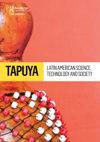拉丁美洲的非洲后裔
IF 1.2
Q2 HISTORY & PHILOSOPHY OF SCIENCE
Tapuya: Latin American Science, Technology and Society
Pub Date : 2022-10-31
DOI:10.1080/25729861.2022.2117480
引用次数: 0
摘要
Pulgarón Garzón(2019)展示了拉斯塔法里文化如何与非殖民主义观点融合,以调查黑人社区和现代非洲社会运动产生的斗争和抵抗形式。作者试图建立关于拉斯塔法里文化的知识,认识并倾听主人公的声音和经历。做拉斯塔法里教徒的方法,他们的话语本文章由计算机程序翻译,如有差异,请以英文原文为准。
Afro-descendancies in Latin America
Pulgarón Garzón (2019) from Cuba shows how Rastafari culture converges with the decolonial perspective to investigate the forms of struggle and resistance generated by black communities and social movements of modern Africa. The author seeks to build knowledge about Rastafari culture, recognizing and listening to the voices and experiences of its protagonists. The ways of doing the Rastafarian subjects, their discourses
求助全文
通过发布文献求助,成功后即可免费获取论文全文。
去求助
来源期刊

Tapuya: Latin American Science, Technology and Society
Social Sciences-Social Sciences (all)
CiteScore
1.60
自引率
0.00%
发文量
39
审稿时长
19 weeks
 求助内容:
求助内容: 应助结果提醒方式:
应助结果提醒方式:


